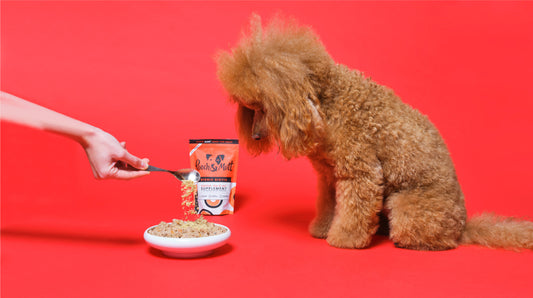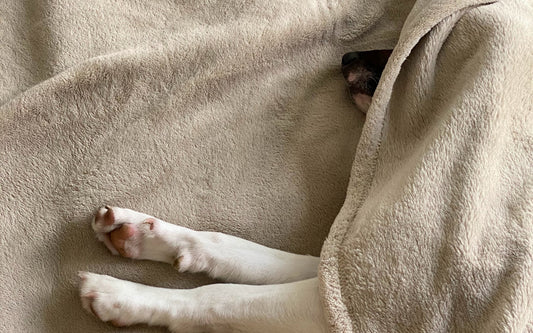Christmas is just around the corner and we couldn't be more excited about it.
And while in many ways December is the most wonderful time of the year, it's also famous for being cold and flu season.
With dark mornings and bitterly cold evenings, it's essential for us to take extra care to keep our immune systems up, but does the same apply for our canine companions?
Find out everything you need to know about dogs and colds this winter. Image Credit: vadim kaipov on Unsplash
- Can dogs get colds?
- Common dog cold symptoms:
- Do dog colds go away on their own?
- Can dogs catch a cold from humans?
- What can I give my dog for a cold?
- How to treat a dog with a cold:

Photo: @curlyteddy_and_poppypopsicle via Instagram
Shop: Ivory Vegan Leather Dog Collar
Can dogs get colds?
No, dogs do not get colds in the same way that humans do. With that being said, dogs are susceptible to catching viruses and infections which cause cold symptoms like sneezing, congestion, runny nose tiredness and laboured breathing.
The main types of cold viruses dogs catch are:
- Kennel Cough
- Parainfluenza Virus
- Canine Respiratory Coronavirus
- Canine Adenovirus Type 2
Common dog cold symptoms:
When dogs develop canine cold viruses, the symptoms they display are very similar to ones that we experience when poorly. Lasting anywhere between 5 - 10 days, the most common dog cold symptoms include:
- Lethargy
- Body aches
- Sore throat
- Watery eyes
- Runny nose
- Congestion
Do dog colds go away on their own?
The answer to this question depends on the type of virus your dog has caught. Generally speaking, mild colds are usually able to resolve themselves with time, rest and plenty of fluids - but it’s always wise to seek expert consultation from your vet.
Veterinarians will be able to determine the underlying cause of your dog’s cold symptoms and recommend appropriate treatment.
💡 Tip: It’s particularly important for puppies and immune-compromised dogs to be taken for assessment as soon as symptoms start.
Can dogs catch a cold from humans?
No. Canine viruses differ from human ones, which means that you don’t need to worry about passing your own cold symptoms onto your dog.
That being said, it is important to be aware of the different viruses that dogs are susceptible to, and the symptoms they usually present in order to give them appropriate care without delay.
What can I give my dog for a cold?
You should never try to treat your dog for a cold without first consulting with your vet.
It’s also really important not to give dogs medication you have at home - such as ibuprofen, paracetamol or sudafed. These drugs can be toxic to dogs, a.
Instead, use the tips below to help make your dog as comfortable as possible when suffering from a cold.
How to treat a dog with a cold:
When dogs suffer from cold viruses, it’s common for them to be a lot more tired and lethargic than usual. Find out how to best treat your dog’s cold and help them along with a speedy recovery:
1. Make sure their bedding and toys are clean
Germs and bacteria thrive in dirty environments, which is why it’s so important to keep your dog’s belongings clean from dirt, food etc. Be sure to regularly wash your dog toys to keep such germs at bay.
In addition - give their bedding, cushions and blankets a good wash.
Not only will this help to kill bacteria, it’ll also make sure they feel extra comfy in their resting space. No one likes sleeping in a dirty or unmade bed!
2. Keep exercise to a minimum
You should always judge your dog’s capacity to exercise, and never force them to move more than they want to - particularly when sick!
Avoid heading off for strenuous activities like hikes or runs. Speak to your vet to find out what’s suitable, as, for example, walking a dog with Kennel Cough isn't recommended.
If your dog seems a little restless, take them out for a short and slow walk (provided your vet gives you the all clear).
💡 Tip: Walking dogs in winter poses greater risks to cold-related illnesses than in summer. Make sure you know the right precautions to take before heading into icy or snowy weather.
3. Avoid contact with other dogs
While dogs can’t pass their viruses to humans and vice versa, dogs can catch colds from other dogs.
For this reason, it’s important to keep your dog away from other pups in your household or when out in public.
4. Fluids, fluids, fluids!
Hydration is key to health - and this is the case for both dogs and humans.
In the same way that it’s important for us to keep our fluids up when sick, you should make sure your dog is drinking plenty of water during their recovery.
It's important to understand how much water dogs and puppies should drink daily, as when they are suffering from colds, they may not want to drink as much as normal.
While this isn’t uncommon, it’s important to proactively help them with this. One way to do this is to give them healthy homemade broth.
5. Help keep their airways clear
A common dog cold symptom is congestion. So if you notice your dog struggling with their breathing, or suffering from a blocked nose, a steamy environment can help.
You can place a humidifier close to their bed, or create steam in the bathroom with a warm bath or shower to help clear their airways and make sleeping far more comfortable.


